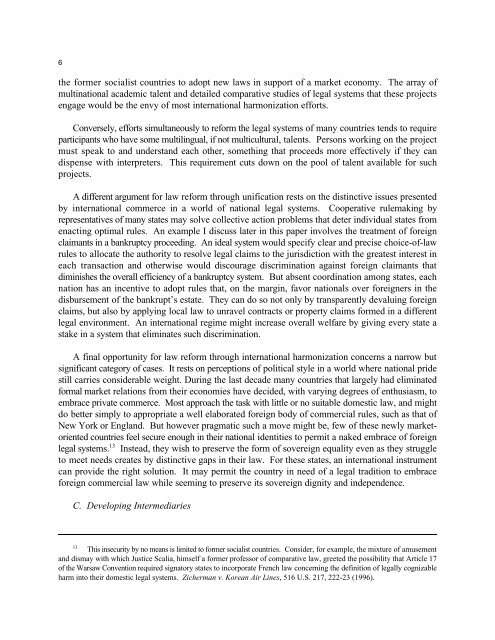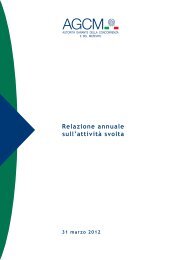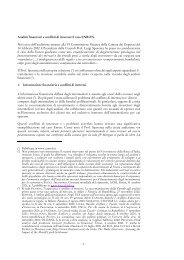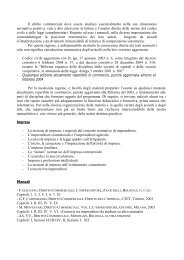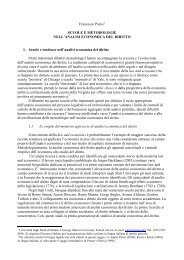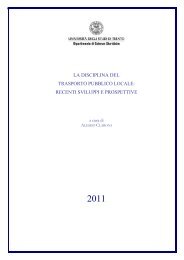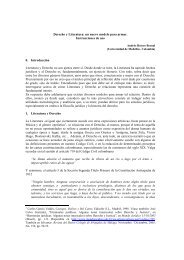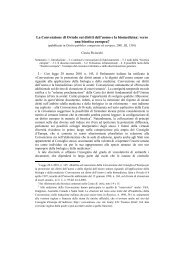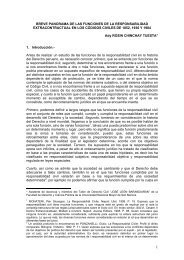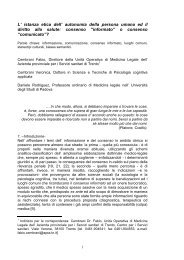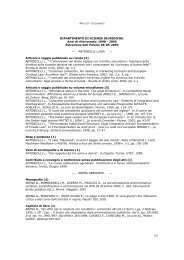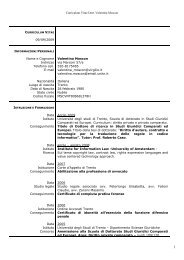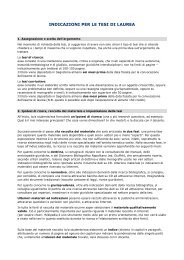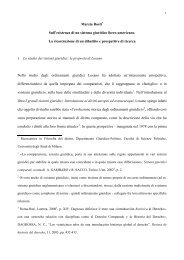The Futility of Unification and Harmonization in International ...
The Futility of Unification and Harmonization in International ...
The Futility of Unification and Harmonization in International ...
You also want an ePaper? Increase the reach of your titles
YUMPU automatically turns print PDFs into web optimized ePapers that Google loves.
6the former socialist countries to adopt new laws <strong>in</strong> support <strong>of</strong> a market economy. <strong>The</strong> array <strong>of</strong>mult<strong>in</strong>ational academic talent <strong>and</strong> detailed comparative studies <strong>of</strong> legal systems that these projectsengage would be the envy <strong>of</strong> most <strong>in</strong>ternational harmonization efforts.Conversely, efforts simultaneously to reform the legal systems <strong>of</strong> many countries tends to requireparticipants who have some multil<strong>in</strong>gual, if not multicultural, talents. Persons work<strong>in</strong>g on the projectmust speak to <strong>and</strong> underst<strong>and</strong> each other, someth<strong>in</strong>g that proceeds more effectively if they c<strong>and</strong>ispense with <strong>in</strong>terpreters. This requirement cuts down on the pool <strong>of</strong> talent available for suchprojects.A different argument for law reform through unification rests on the dist<strong>in</strong>ctive issues presentedby <strong>in</strong>ternational commerce <strong>in</strong> a world <strong>of</strong> national legal systems. Cooperative rulemak<strong>in</strong>g byrepresentatives <strong>of</strong> many states may solve collective action problems that deter <strong>in</strong>dividual states fromenact<strong>in</strong>g optimal rules. An example I discuss later <strong>in</strong> this paper <strong>in</strong>volves the treatment <strong>of</strong> foreignclaimants <strong>in</strong> a bankruptcy proceed<strong>in</strong>g. An ideal system would specify clear <strong>and</strong> precise choice-<strong>of</strong>-lawrules to allocate the authority to resolve legal claims to the jurisdiction with the greatest <strong>in</strong>terest <strong>in</strong>each transaction <strong>and</strong> otherwise would discourage discrim<strong>in</strong>ation aga<strong>in</strong>st foreign claimants thatdim<strong>in</strong>ishes the overall efficiency <strong>of</strong> a bankruptcy system. But absent coord<strong>in</strong>ation among states, eachnation has an <strong>in</strong>centive to adopt rules that, on the marg<strong>in</strong>, favor nationals over foreigners <strong>in</strong> thedisbursement <strong>of</strong> the bankrupt’s estate. <strong>The</strong>y can do so not only by transparently devalu<strong>in</strong>g foreignclaims, but also by apply<strong>in</strong>g local law to unravel contracts or property claims formed <strong>in</strong> a differentlegal environment. An <strong>in</strong>ternational regime might <strong>in</strong>crease overall welfare by giv<strong>in</strong>g every state astake <strong>in</strong> a system that elim<strong>in</strong>ates such discrim<strong>in</strong>ation.A f<strong>in</strong>al opportunity for law reform through <strong>in</strong>ternational harmonization concerns a narrow butsignificant category <strong>of</strong> cases. It rests on perceptions <strong>of</strong> political style <strong>in</strong> a world where national pridestill carries considerable weight. Dur<strong>in</strong>g the last decade many countries that largely had elim<strong>in</strong>atedformal market relations from their economies have decided, with vary<strong>in</strong>g degrees <strong>of</strong> enthusiasm, toembrace private commerce. Most approach the task with little or no suitable domestic law, <strong>and</strong> mightdo better simply to appropriate a well elaborated foreign body <strong>of</strong> commercial rules, such as that <strong>of</strong>New York or Engl<strong>and</strong>. But however pragmatic such a move might be, few <strong>of</strong> these newly marketorientedcountries feel secure enough <strong>in</strong> their national identities to permit a naked embrace <strong>of</strong> foreign13legal systems. Instead, they wish to preserve the form <strong>of</strong> sovereign equality even as they struggleto meet needs creates by dist<strong>in</strong>ctive gaps <strong>in</strong> their law. For these states, an <strong>in</strong>ternational <strong>in</strong>strumentcan provide the right solution. It may permit the country <strong>in</strong> need <strong>of</strong> a legal tradition to embraceforeign commercial law while seem<strong>in</strong>g to preserve its sovereign dignity <strong>and</strong> <strong>in</strong>dependence.C. Develop<strong>in</strong>g Intermediaries13This <strong>in</strong>security by no means is limited to former socialist countries. Consider, for example, the mixture <strong>of</strong> amusement<strong>and</strong> dismay with which Justice Scalia, himself a former pr<strong>of</strong>essor <strong>of</strong> comparative law, greeted the possibility that Article 17<strong>of</strong> the Warsaw Convention required signatory states to <strong>in</strong>corporate French law concern<strong>in</strong>g the def<strong>in</strong>ition <strong>of</strong> legally cognizableharm <strong>in</strong>to their domestic legal systems. Zicherman v. Korean Air L<strong>in</strong>es, 516 U.S. 217, 222-23 (1996).


